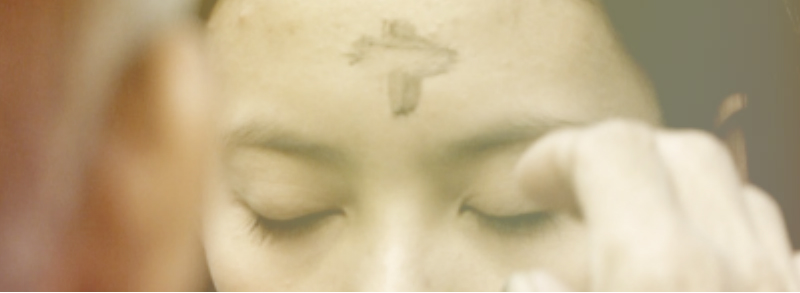As I write this, the Christian/Catholic community at St. Edward’s University, along with Catholics around the world, are getting ready for the beginning of Lent. By the time you might read this, we Catholics will have already experienced the Ash Wednesday observance, which involves the receiving of ashes on the forehead by one’s local priest to the tune of, “Repent and believe in the Gospel.” The ashes come from the leftover palms from the previous year’s observance of Palm Sunday, which marks Jesus’ entrance into Jerusalem.
You have a smudge on your face!
The disposition of ashes in the form of a cross upon a person’s forehead is not as easy as it might seem. It takes a bit of talent and a good steady hand. Catholics have a pretty good self-depracating humor, so we even have descriptions for some of the artistic renditions of ashes. These include the “blob”, which looks more like a large thumb print, the “Rorschach”, which you can probably imagine what that looks like, the “mini”, which can barely be seen from any distance, and my favorite, unless I am the recipient, the “Father’s Revenge”, which is usually the size of a Crusader Cross that can been seen from a mile away.
Regardless of the outcome, we have no control over the type of cross we receive. We walk out into the street enduring for the rest of the day, people telling us we have something on our forehead, trying to do us a favor.
Why Ashes?
So, why do Catholics and many other Christians line up every year for ashes? The quick answer is that it is an appropriation of the Jewish penitential practice by the early Church, based upon the book of Daniel: I turned to the Lord God, pleading in earnest prayer, with fasting, sackcloth, and ashes” (9:3). The reception of ashes is an outward sign that one is acknowledging their sin before God and their community (an important aspect) and desiring to continue to seek Christ in their life.
I am reminded of Matthew 5:23-24, where we are commanded to set aside our offering to the Lord if we have offended someone, to take care of the offense and then come back to honor God. The Lenten season is such a setting aside. It is 40-some days of spending time in the wilderness of our lives, fasting, praying, seeking a hunger for God, coming to grips with our dependence upon God, knowing that despite the facades we often put up in a culture that does not quickly embrace signs of weakness, that as a children of God, we can acknowledge that we are frail and weak. We can acknowledge that in our weakness, God is a resting place for us, that Christ is a refuge. The Christian faith is incarnational, because Christ came into THIS world. It is in the ashes of our daily lives, our finances, our neighbors, our jobs and professions, our treatment of others personally and institutionally, every aspect of life, that we must reconcile with God through the grace of Christ’s death on the cross.
This is a difficult process requiring discipline and intentionality. It is one of the things I love about the Catholic tradition, the numerous rituals, practices, observances, saints, prayers by rote, that all help us to build spiritual disciplines. Can any of these take on more importance in and of themselves than they should? Absolutely! Do we need to repeat the receiving of ashes each year to ensure our salvation? Probably not, or at least no more than we need to go to that 23rd altar call of our life. But they serve as markers, as reminders of who we claim to be.
Conclusion
It is a joy to see St. Edward’s students gather each week for Mass, for reconciliation, for the blessing of Brains, the blessing of throats for colds, and yes, for ashes. These are opportunities for them to publicly profess their faith and devotion, to remind themselves of their own desire to follow Christ, even when they don’t always know what that means.
For one day, they will walk around campus and go out into the Austin community with smudges on their foreheads. Hopefully they will have gotten a decent cross of ashes, which makes it easier to respond to everyone trying to let them know their face is dirty. And hey, what a great opportunity to share one’s faith, through the true curiosity of others.
Dr. James Puglisi is the Associate Director of Campus Ministry at St. Edward’s University in Austin, Texas. He received his B.A. from Allegheny College, Meadville, PA in Anthropology of Religions received his Doctor of Ministry from Catholic Theological Union in the area of Practical Theology. His doctoral writing was titled “Shalom: The Role of Truth Telling in Creating Communities of Racial Reconciliation within Institutions of Christian Higher Education.” He teaches courses in the area of migration and culture and has presented at conferences on racial reconciliation and inter-religious dialogue. He is originally from Pittsburgh, PA.

